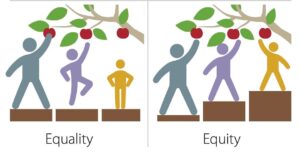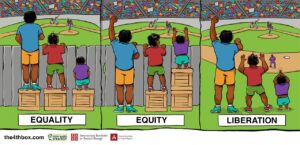The Collins dictionary defines equitable as something fair and reasonable in a way that gives equal treatment to everyone.

This Photo is created on Canvas
In the words of the supporting speakers: “Technology has enhanced easy access to information, enabling individuals or students to acquire new knowledge or skills regardless of their geographic location or financial status. Technology has changed how we learn by providing various virtual opportunities, thus making quality education accessible to students even in remote areas.”.
The speakers also talked about how telemedicine has provided easy access to health care without the need to travel long distances before seeing a doctor or their health provider. In one of the articles shared by the supporting speakers, Damarin (2020) indicated that the digital divide is not solely defined by a binary distinction of having or not having access to technology but also considers the disparities in the quality and level of access among different groups or individuals. Drawing connections between this assertion and a publication by Dot’s Chief Executive Officer and Co-Founder, Ju-Yoon in the World Economic Forum report of 2023, it was noted that “the issue of accessibility strongly aligns with Sustainable Development Goal 10, which aims to reduce inequality,” with technology playing a role in mitigating such disparities to a certain degree. For instance, many visually impaired individuals face challenges accessing visual digital content. However, the use of assistive technologies has helped bridge this gap to a certain level.

This Photo by Unknown Author is licensed under CC BY-NC
The opposing side argued that the digital divide is driving a wedge into society, slowly widening the gap between achieving opportunity and utterly falling behind in a changing technologically advanced world. The speakers argued that technology has brought about more divides in gender, power, and democratic voice in areas of low economic growth, language, and little education between rural and urban areas or less industrially developed countries. According to Damarin (2020), the digital divide can manifest in various forms, including differences in access to hardware, internet connectivity, digital skills, and the ability to leverage technology for educational, social, or economic purposes. In the resources shared by the opposing speakers, there are concerns about issues with broadband becoming a basic need, and people in rural communities having issues with connectivity and safety.

Illustration photo obtained on Google
Reflecting on the state of society in the past as compared to the present, I think the issue of equality and equity will always be inevitable. But it seems the vision around these constructs has changed over time to embrace inclusion; and technology has really helped to enhance inclusion. From a personal perspective, technology has helped build the confidence of women to take up STEM courses that were always stereotyped as being for MEN. We have a lot of girls now enrolling in mathematics, computer science, and physics careers. These changes wouldn’t have been possible without partnerships. The only way we can continue addressing the issue of equity and equality is through partnerships with various organizations and stakeholders. Well, I think technology has not really led to an equitable society but rather has enhanced the provision of equal opportunities to individuals and access to information around the world.
“Technology is essential to every company invested in the future of society and humanity. Providing equitable access to work-ready learning and skills can equip individuals in real-time and for the future of work and promote an equitable workplace.”

Thank you for your in-depth thoughts about this debate Ayodele. As one of the debaters, you have done an excellent job of including arguments made by both sides while still sharing your point of view.
I do appreciate you including the definition of equitable in your post as this was important to the group when debating. You have mentioned the benefits to partnerships and the opportunities those have brought. This is something the debate did not have time to discuss enough! I also think your use of graphics to help explain is relevant and supports your overall reflection.
I really like the picture describing the difference between equality, equity and liberation. I am curious what that would look like in terms of educational technology.
If equality is that everyone gets a laptop (picture on the left), and equity is that everyone gets a laptop with apps on it that best supports their learning needs, what would liberation look like?
Great post, Ayodele Ogegbo!
I really appreciate how you separated and elaborated on the concepts of equality and equity. The way you presented your viewpoint is very convincing. I also agree that STEM concepts have often been geared towards men. This reminds me of a story about my cousin. She was told in her mechanical engineering course that girls can’t handle gadgets and heavy equipment. Despite this, she completed her engineering degree from MIT and scored very well.
Thanks for sharing your thoughts!
Thanks for the debate and this reflection, Ayodele! Technology has its advantages and disadvantages and we need to be cognizant of the needs of the children and apply technology to its optimum use. The digital divide is increasing and needs to be bridged for better utilization of technology.
Your post provides a thorough examination of how technology can both bridge and widen societal gaps. The main takeaway for me is the critical distinction between equality and equity, highlighting the necessity for tailored solutions to address diverse needs effectively. This was a really tough debate for me! Considering the ongoing challenges related to the digital divide, what specific initiatives or partnerships do you think could be most impactful in ensuring technology contributes to a more equitable society?